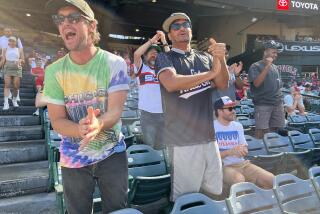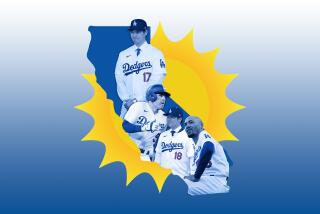Down and Out in Kingdome
SEATTLE — Here lies Mark Langston.
If ever a picture was worth a million words, this was the one.
If ever one frozen moment in time embodied the essence of a tortured franchise that, let’s face it, has to be cursed--were they Caligula’s Angels in a previous lifetime?--it was captured on the floor of the Kingdome in the bottom of the seventh inning of Monday’s one-game playoff for the American League West championship.
What could Langston have been thinking as he lay in the dirt of the batter’s box, back on top of home plate, eyes glued to the gray concrete ceiling above him, hands clasped and folded across his chest, for what seemed to be an eternity?
Was that really Luis Sojo, who hardly hit a thing when he played for the Angels, who just cleared the bases for Seattle with a broken-bat cue ball inches inside the first-base line?
Did a six-time Gold Glove award-winning pitcher just cut off an otherwise perfect relay from Tim Salmon and throw the baseball all the way to the backstop, enabling Sojo to saunter home for the equivalent of an inside-the-park grand slam?
Now that it’s 5-0, Seattle, is it possible to score six runs off Randy Johnson without hitting the ball?
When’s the next flight out of here, anyway?
If I lie like this long enough, do you think the ground might open up and please swallow me whole?
If the Angels wanted an official logo to commemorate their 35th anniversary season, they can stop looking now. This is the one. The scene was complete, except for, possibly, a white lily wedged between Langston’s fingers.
Another Angel dream of postseason liberation rests in pieces.
Monday was the Angels’ last chance to remove the stigma of their unprecedented late-season collapse--from 13 games ahead of Seattle to three games down in less than two months. If they won here, they would go to New York as newly crowned champions of the AL West, September swoon be damned. And to get here, the Angels won their last five regular-season games in succession, which required Chuck Finley winning twice in a week on three days’ rest and Mike Harkey throwing 6 2/3 scoreless innings against Oakland and craning their necks to spy on the scoreboard, begging the Texas Rangers to beat the Mariners twice during the final weekend.
Once here, they tried to put the ball in play against Big Unit Johnson amid the backdraft of 52,356 screaming sets of lungs cheering every strike against the Angels--and there were truckloads of them.
The Angels lost, 9-1.
They managed three hits and didn’t have a baserunner until there were two outs in the sixth inning.
Why did they even bother?
Yet, it was still a 1-0 ballgame in the bottom of seventh when Sojo, mighty Sojo, came to bat. There were two outs, the bases were loaded and Langston seemed on the verge of pitching out of a self-inflicted jam. Tino Martinez reached base when the normally sure-handed Langston bobbled his sacrifice bunt. Joey Cora reached, too, when, Langston, failing to heed the mistakes of history and Shawn Boskie, plunked the Mariner second baseman with a 1-2 pitch.
But a sliding catch by Salmon had just denied Vince Coleman two or three RBIs. Sojo was next, and Langston knew him too well. Luis Sojo--the trade that burned the Angels coming and going. He came to the Angels in 1991 in the deal that sent Devon White to Toronto and World Series glory, and he went back to Toronto before the 1993 season in exchange for Kelly Gruber’s one-functional rotator cuff.
So this is how Whitey Herzog contributed to the Angels’ playoff bid of ’95. Sojo bounces from Anaheim to Toronto to Seattle to the bottom of the seventh in the AL West championship decider. Fancy meeting the Angels here.
Who’d have fancied him beating the Angels here?
Sojo swung at Langston’s first pitch and broke his bat. “A good pitch,” catcher Andy Allanson assessed, “but that’s obvious. If you go up there and break 27 bats, you’re doing your job.”
But the ball pogoed down the first-base line and spun away from first baseman J.T. Snow. “I thought I had it,” Snow said. “I don’t know if it hit a seam or the dirt or what, but it looked like a cue shot.”
And the baseball rolled across the green artificial turf like a billiards shot aiming for the side pocket. Two runs were in by the time Salmon fielded it and fired home, trying to nail Cora.
He might have too, except Langston was stationed up the line between home and first base, cutting the ball off and then misfiring, miserably, to Allanson.
“He should have been behind the plate, backing up the throw,” Manager Marcel Lachemann said of Langston. “He must’ve thought J.T. was going to make the play, and his first reaction was to cover first base.”
Cora scored on Langston’s error and before Allanson could peg the ball back to Langston at the plate, Sojo did too.
At that point, gravity and frustration caved in Langston. He flopped on his back and didn’t get up, not for several seconds--the Angel collapse of ‘95, conceived as performance art.
So what was he thinking down there?
“The whole game flashed before my eyes right there,” Langston said. “I was just thinking, ‘We were so close. I can’t believe it turned out the way it turned out.’ ”
Really?
Haven’t 35 years of false finishes and booby-trapped Octobers taught us anything about this team?
Langston, the Gold Glove pitcher, errs in the clutch.
Sojo, the banjo-hitting Angel reject, turns a 1-0 struggle into a rout.
Only the Angels, only the Angels.
“I can see the irony of it,” Angel president Richard Brown said as he slumped against the wall outside Lachemann’s office.
“It’s baseball. There’s nothing to say other than ‘That’s baseball.’ It’s just a shame, after the tenacity we showed to win our last five games to get here, and then you lose it like that.”
Brown flashed back to the indelible image of the hour: Langston on his back and the Angels down for the count.
“That picture probably summarizes everything for him and us,” Brown said. “He gave it all for seven innings and then this. What can you say?”
After “Enough already,” there isn’t much.
More to Read
Go beyond the scoreboard
Get the latest on L.A.'s teams in the daily Sports Report newsletter.
You may occasionally receive promotional content from the Los Angeles Times.










